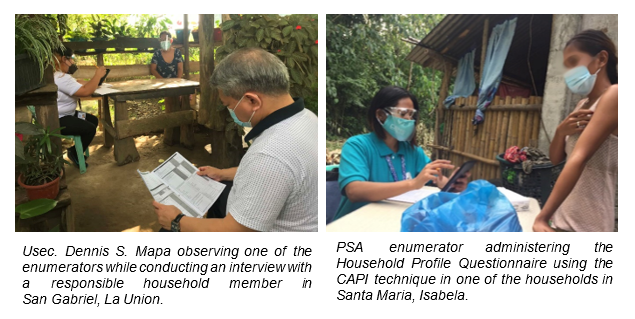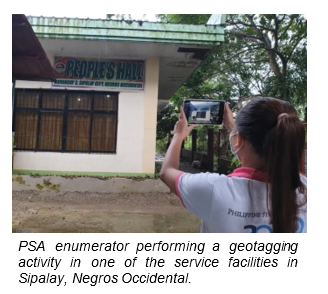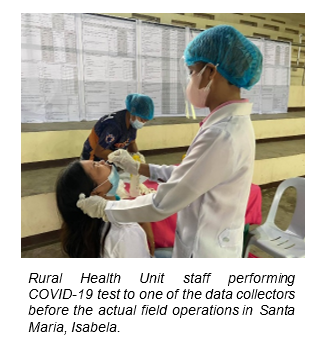
The Philippine Statistics Authority (PSA)–led 2021 Pilot Community-Based Monitoring System (CBMS) field data collection in nine cities/municipalities commenced on 15 October 2021 and is expected to wind up by the third week of December 2021.
The Pilot CBMS aims to test all aspects of the operations in preparation for the nationwide rollout in 2022. The CBMS is a technology-based system of collecting, processing, and validating necessary disaggregated data that may be used for planning, program implementation and impact monitoring at the local level while empowering communities to participate in the process. It is conducted pursuant to Republic Act No. 11315.
Prior to the field data collection proper, an eight-day rigid training of enumerators on the Household Profile Questionnaire (HPQ), CBMS concepts, and the use of the applications for interviewing were undertaken. This was immediately proceeded by courtesy calls with officials of the city/municipality and barangay local government units (BLGUs) and ocular inspection of the areas to be enumerated. The nine CBMS pilot LGUs are: San Gabriel, La Union; Santa Maria, Isabela; Samal, Bataan; Sipalay City, Negros Occidental; Dauin, Negros Oriental; Baybay City, Leyte; Bayugan City, Agusan del Sur; Baguio City; and Sual, Pangasinan, with the first seven LGUs being PSA-funded while the last two LGUs funding their CBMS implementation from their own LGU budget.
In this year’s pilot operations, a total of 945 enumerators, 190 team supervisors, and 39 CBMS area supervisors are involved. Household-level information are obtained through Computer-Assisted Personal Interviewing (CAPI) approach – a face-to-face interview of a responsible household member using an electronic questionnaire contained in a handheld tablet
As of 08 December 2021, almost 70.0 percent of all the households in the PSA-funded pilot areas were successfully interviewed.


Aside from household- and individual-level information, the CBMS also aims to collect barangay-level data. As of 08 December 2021, 366 out of 372 barangays in the pilot areas have submitted their responses to the Online CBMS Barangay Profile Questionnaire Computer-Aided Web Interview (CAWI) platform.
Through the conduct of the CBMS, key development indicators on (a) health, (b) nutrition, (c) housing, (d) water and sanitation, (e) basic education, (f) income, (g) employment, and (h) peace and order at the city/municipality level can be made available for evidence-based local level planning and investment programming. CBMS data, likewise, is intended to provide basis for targeting beneficiaries of various social protection programs of the government, as well to provide inputs to more comprehensive poverty analysis
For more information on the CBMS, you may visit the PSA CBMS webpage at www.psa.gov.ph/cbms.
- Community-Based Statistics Service, Censuses and Technical Coordination Office
